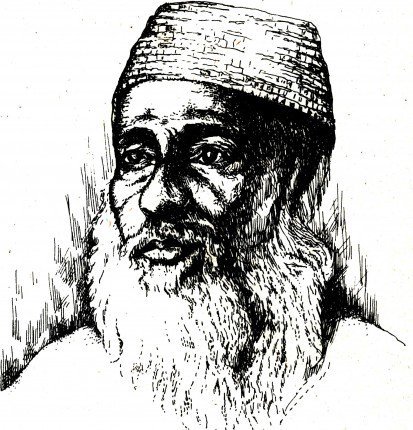
Exposed to the aftermath of the country’s greatest human tragedy caused by nature, the Maulana was reportedly seen ‘weeping like a child’ many times during the tour.
Monitoring Desk
On 19 November 1970, a week after the tragedy, students held a march in Dhaka, the capital of Pakistan’s eastern province, protesting the slowness of the government response. A statement released by eleven political leaders in East Pakistan ten days after the cyclone hit charged the government with “gross neglect, callous and utter indifference”.
Relief work neglected
The Pakistan Red Crescent began to operate independently of the government as the result of a dispute that arose after the Red Crescent took possession of 20 rafts donated by the British Red Cross. A pesticide company had to wait two days before it received permission for two of its crop dusters, which were already in the country, to carry out supply drops in the affected regions.
A reporter for the Pakistan Observer spent a week in the worst hit areas in early January and saw none of the tents supplied by relief agencies being used to house survivors and commented that the grants for building new houses were insufficient. The Pakistan Observer regularly carried front page stories with headlines like “No Relief Coordination”, whilst publishing government statements saying “Relief operations are going smoothly.”
In January (1971), the coldest period of the year in East Pakistan, the National Relief and Rehabilitation Committee, headed by the editor of The Daily Ittefaq (Dainik Ittefaq), said thousands of survivors from the storm were “passing their days under [the] open sky”. A spokesman said families who were made homeless by the cyclone were receiving up to 250 rupees (£30 in 1971, £200 in 2007) to rebuild, but that resources were scarce and he feared the survivors would “eat the cash”.
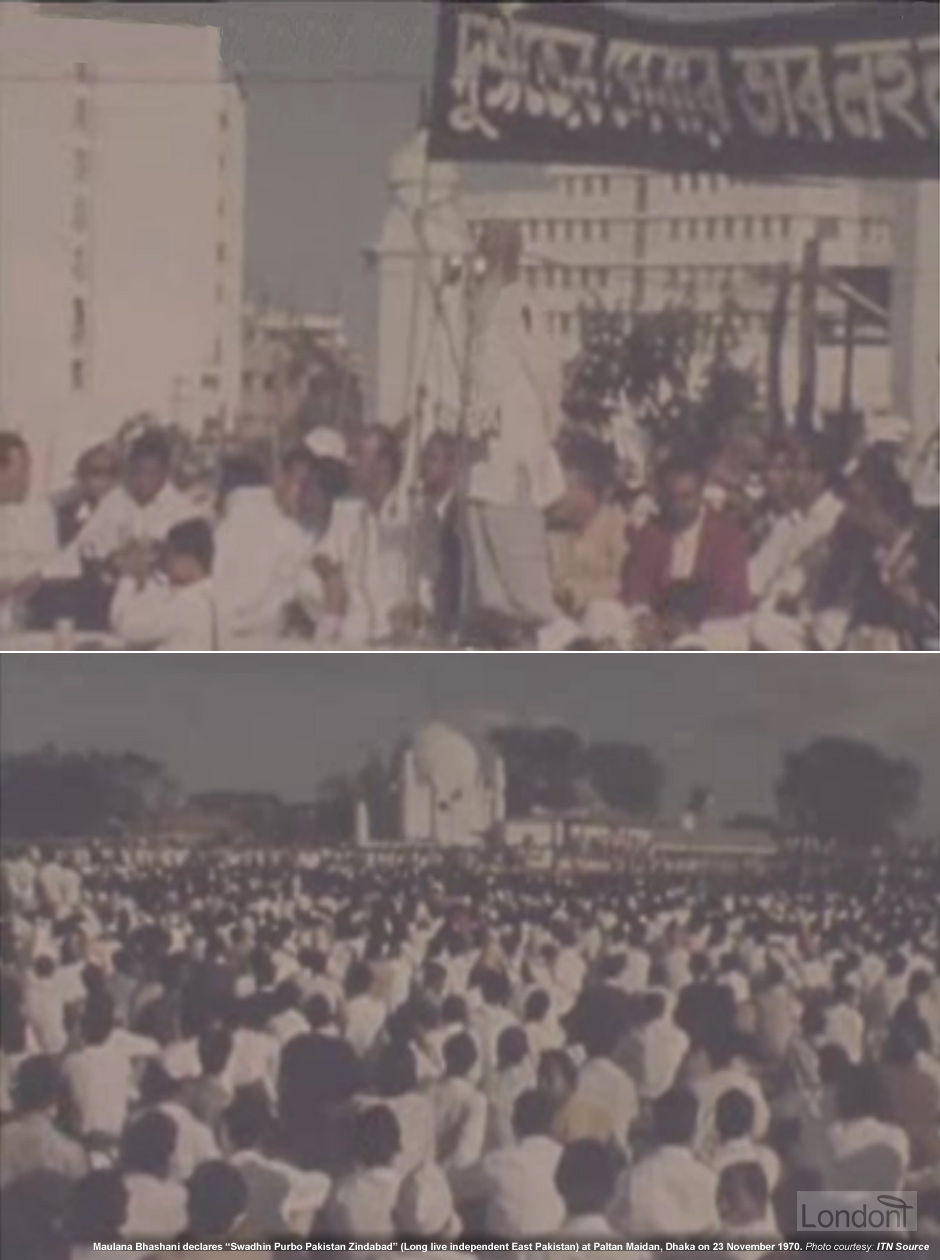
Maulana’s mass rally attended by 50,000 people
The most scathing Bengali criticism of West Pakistan had in fact emanated not from Sheikh Mujib’s Awami League, but from the 90-year-old veteran NAP leader Maulana Bhashani, known as the “Lal Mullah” (Red Mullah) because of his egalitarian-leftist views. The Maulana declared, as early as September 1970, that if concrete steps were not taken to correct interregional inequalities and provide greater protection for East Pakistan from natural woes, it would be forced to separate and befriend whomever it wanted. He also called for “complete financial autonomy” for East Pakistan.
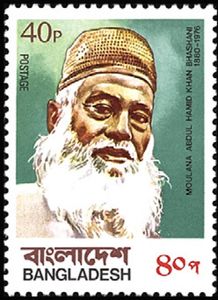 The Maulana, grievously ill and under treatment at a nursing home in Dhaka, famously ignored his physicians’ advice, dropped his political work and rushed to Manpura, the worst affected part of Bhola, after an arduous journey by train, motor launch, country boat, and sometimes on foot. Here he comforted the bereaved and railed against central government’s hard-heartedness and indifference.
The Maulana, grievously ill and under treatment at a nursing home in Dhaka, famously ignored his physicians’ advice, dropped his political work and rushed to Manpura, the worst affected part of Bhola, after an arduous journey by train, motor launch, country boat, and sometimes on foot. Here he comforted the bereaved and railed against central government’s hard-heartedness and indifference.
When news of the cyclone and pictures of the dead bodies were published in newspapers, it created a huge uproar in East Pakistan. At that time, Moulana Bhashani was in hospital in Dhanmondi, Dhaka. Bhashani was so sick that the doctors had almost declared him clinically dead.
On 12 November 1970, the same day the cyclone hit the country at night, I went to the hospital to see Moulana. I met Aziz Bhai, (Doctor Aziz, ex Minister) and I asked him about his health and he replied ‘very critical, anything can happen any time’. I stayed there till midnight.
On the morning of 13 November 1970, I rushed to the hospital and stepped into his room to discover the Moulana awoken from deep slumber, as if through a miracle. The attending nurse called the doctor. Bhashani looked at the door and asked for the newspaper, but nobody dare to give it to him.
But when he asked for it repeatedly and looked at me askance, I ultimately gave him the newspaper I was carrying with me. The paper was full of pictures of dead bodies and included the whole story of how the then East Pakistan was neglected by the Pakistani military junta. After reading and seeing it, Moulana Bhashani was so furious that he shouted ‘I will go there to see how cyclone devastated the areas and what the government did’. All the doctors attending to him said ‘you can’t go Huzur; your health condition does not permit that’. He did not listen to anybody and right away told somebody to pack up his personal belongings and then just set about to visit the cyclone-affected areas. We all are God’s creation but Moulana Bhashani was an extraordinarily blessed person who looked younger than his age and could travel great lengths even at old age.
Everywhere he went he delivered fiery speeches against the military junta and provided hope and inspiration to people. All of his speeches were extraordinary. He visited all the affected areas including Barisal, Patuakhali, Sirajganj, Noakhali, Chattragram and Dhaka.
Exposed to the aftermath of the country’s greatest human tragedy caused by nature, the Maulana was reportedly seen ‘weeping like a child’ many times during the tour.
Returning to Dhaka on 22 November 1970, Maulana Bhashani held a press conference to inform the people, both at home and abroad, about the colossal scale of the tragedy. He made emotional appeals to people all around the world to help the afflicted people whilst condemning the Islamabad-based central government for not having “cared to visit the hapless citizens of the East”. The next day (23 November 1970) the no-nonsense Maulana said “Assalamu’alaikum” to West Pakistan in a mammoth public rally held in Paltan Maidan – the traditional forum for public dissent – and attended by 50,000. ‘Assalamu’alaikum’ is an Arabic term meaning ‘Peace be upon you’ and used by Muslims to greet and say goodbye to each other.
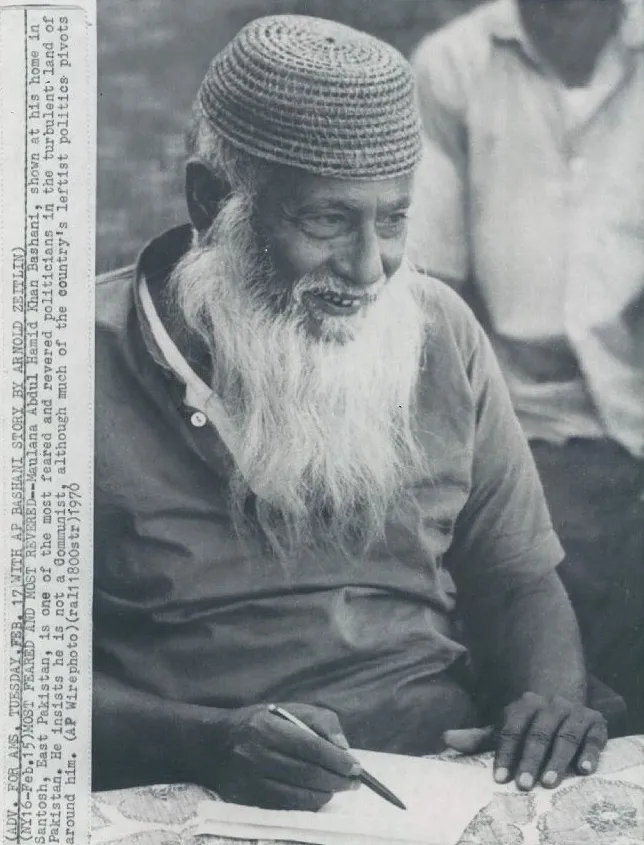 During his speech, Maulana Bhashani described graphically the extent of devastation caused by the natural calamity to the public: how 1,000,000 – 1,200,000 human beings had been killed by the cyclone, how their homesteads and livestock had been washed away, how nearly 400,000 mutilated bodies of men, women and children, along with hundreds of mutilated livestock, were still lying under the open sky and, how the survivors were struggling for their lives without food and shelter.
During his speech, Maulana Bhashani described graphically the extent of devastation caused by the natural calamity to the public: how 1,000,000 – 1,200,000 human beings had been killed by the cyclone, how their homesteads and livestock had been washed away, how nearly 400,000 mutilated bodies of men, women and children, along with hundreds of mutilated livestock, were still lying under the open sky and, how the survivors were struggling for their lives without food and shelter.
Maulana Bhashani argued that past events and current government indifference to cyclone victims by way of suppressing the news and distancing itself from the miseries of the Bengalis at the time of their greatest misfortune proved Pakistan had by then become ‘anachronistic and pointless’ and thus declared “Independent East Pakistan”.
Swadhin Purbo Pakistan Zindabad (Long live independent East Pakistan)
Maulana Bhashani’s concluding remark in Dhaka’s Paltan Maidan on 23 November 1970
The Maulana also demanded the president’s resignation, and announced that his NAP party would not participate in the upcoming general and provincial elections. He questioned the ethics of election campaigns at a time when people needed aid.
Maulana Bhashani had already boycotted the election. The tragedy of the cyclone only provided an excuse for his pre-existing stance against the election.
His famous speech was epitomized in the poem “Safed Panjabi” (White Panjabi) by notable Bengali poet Shamshur Rahman. The poet was so moved by the tragedy and Bhashani’s speech that it inspired him to write the poem as a reference to the white clothing adorned by the Maulana as he delivered his speech.
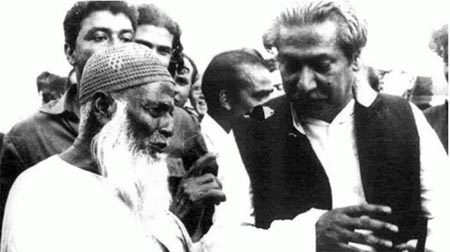
Sheikh Mujib’s frustration further intensifies student’s sentiment
Three days after the Maulana’s declaration, Sheikh Mujibur Rahman also voiced his anger in a press conference. Coming back from his trip to the cyclone-torn areas, Sheikh Mujib called a press conference at Hotel Shahbag, Dhaka, on 26 November 1970. He came in and sat on the seat reserved for him, flanked by Tajuddin Ahmad to his right and Syed Nazrul Islam to his left. Dr. Kamal Hossain and other leaders were seated in the back row. He declared that the government’s failure to help cyclone victims represented a failure of Pakistan more than of Yahya Khan’s regime. Asked if he was considering secession, he replied, “Not yet”. His ‘autonomy not independence’ stance was supported by some pro-Awami League newspapers in the eastern wing, which also criticized Maulana Bhashani for his pronouncement of ‘independence’ three days earlier.
As Bangabandhu greeted his audience and began speaking, a storm of flash bulbs went off against the constant clicking of cameras. Bangabandhu expressed his grief for the loss of hundreds of thousands of people and their properties. He went on with great pain, as he described the miserable plight of those who were still alive.
He scathingly criticized the neglect and apathy of the human crisis by the central and provincial governments of Pakistan. He then explained how the Six-Point Charter, drawn by the Awami League, was essential and could have helped the people during such a tragedy. He stressed that if there was autonomy in East Pakistan, this kind of calamity could have been better managed. We wouldn’t have to look for help from a Central Government that rests peacefully thousands of miles away.
I have demanded regional autonomy, not independence.
Sheikh Mujibur Rahman on 26 November 1970 when asked about his stance on the independence of East Pakistan
***
East Pakistan must achieve self-rule by ballot if possible, and by bullet, if necessary.
Sheikh Mujibur Rahman defiant stance just like Maulana Bhashani
Maulana Bhashani’s and Sheikh Mujib’s public declaration gave the student protest more momentum and on 4 December 1970, few days after their rallying cry, the Chhatro League (Student League) demanded the release of political prisoners and raised two new slogans: “Peasants and workers: take up arms to make Bangladesh independent!” and “Raise a Ganabahini (People’s Force) to make Bangladesh independent!”
The administration has failed. That is the most important thing. And why they fail? I say their intention was not good. Otherwise, why did the Central Government failed to send helicopters from West Pakistan to East Pakistan? Tell me, the helicopters can come from UK, can come from USA, can come from other further countries, why helicopters can’t come from West Pakistan to East Bengal?
Can anybody justify it? Any government can justify it?
Sheikh Mujib criticizes Pakistani government for their failure to provide relief support
_________________
Known around the subcontinent for his selflessness character and solidarity with the oppressed people, Bhashani was the founder and president of the Pakistan Awami Muslim League which later turned into Bangladesh Awami League. He was also founder the National Awami Party (NAP). Some of his fellows called him as ‘The Red Maulana’ due to the involvement of communist and left politics.
Early Life
Abdul Hamid Khan Bhashani was born on December 10, 1880, in Sirajganj, British India (Bangladesh) to Haji Sharafat Ali Khan and Ms. Mojiron Bibi. He studied at the Deoband Madrasah between 1907 and 1909. He was the youngest child of five siblings born to his parents. At early childhood, his father died and a few days later mother along with two brothers also died. Following the lost his nearest relatives, he passed a few days under his uncle.
Political Career
Bhashani began his career journey as a primary school teacher at Kagmaree, Tangail. In 1917, he joined the Nationalist party as an activist led by Desbandhu Chittaranjan Das. Two years later, he joined Indian National Congress in 1919. Following the year, he was arrested and imprisoned. He participated in Das’s Non-cooperation movement against British Imperialism eventually suffered imprisonment with numbers of followers. In 1930, he joined Muslim League and elected MLA in Assam Legislative Assembly from Dhubri. He was elected president of Muslim League in 1944.
After separation of India and Pakistan he established Pakistan Muslim League on June 23, 1949, he was the founder president and Shamsul Huq was the first general secretary of the party. He formed the ‘All Party Language Movement Committee’ demanding of Bangla will be a national language in Pakistan. Removing ‘Muslim’ he renamed the Awami Muslim League as the Awami League in 1953. Following the year, he went to Stockholm and barred returning to East Pakistan by Iskander Mirza branded as a communist. In 1957, at the Kagmaree Conference of Awami League, he clued the separation of Pakistan stated ‘Walakumusalam’.
He protested against government ban against Rabindranath Tagore and to withdraw the Agartala Conspiracy Case and for the release of Sheikh Mujib.
Liberation War
During the liberation war, he requested to China to help in the liberation war of Bangladesh but the county didn’t give an answer. He also requested Russia to take a step against the killing of civilians in Bangladesh by Pakistanis. He was an advisor of the Mujibnagar Government.
Personal Life
Bhashani married Alema Khatun, a daughter of Jamidar Shamsuddin Ahmed Chowdhury, in Joypurhat. He also married more two times due to political purpose. Hamid Khan died on November 17, 1976, in Dhaka aged 96 and resting at Santosh, Tangail.
___________________
Courtesy: Londoni (The Londoni website was officially launched on 26 March 2012 – on the 41st birthday of Bangladesh – with the intention of providing the English-speaking global community with insight into the vibrant culture and mammoth history of Bangladesh – Abdus Samad (Jaber), Founder of Londoni Worldwide Limited)